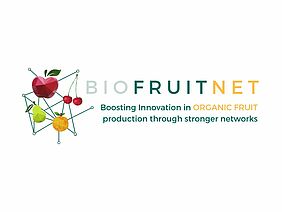Over the past 3.5 years, existing practical and scientific knowledge on organic fruit-growing was collected and synthesized within the framework of the EU project BIOFRUITNET, distributing it widely among European countries through easily accessible formats like e-learning courses, podcasts, videos and practice abstracts. Moreover, farmers from all over Europe took part in visits to demonstration farms, exchanging their knowledge and creating strong networks of organic fruit producers and other stakeholders in the sector.
Farm visits to foster knowledge exchange
During farm visits within the BIOFRUITNET project, hedges were one of the measures presented to increase biodiversity in orchards. Birds of prey often nest in higher trees of hedgerows, which eat the mice in the orchards and thus control their population. Furthermore, they protect organic areas from drift if they are planted on the border to neighboring conventional farms.
In another farm visit, EU fruit farmers were able to inspect anchor plants, learn more about the measure and exchange ideas with the experts. There, they saw the positive effects that anchor plants have on indifferent aphid populations and their predators. Subsequently, a short video on the event was published online. Thus, interested parties can find out more about measures to increase biodiversity in organic orchards.
Facilitate access to knowledge
Soil management and fertilization as well as plant protection against diseases and pests are the most important areas for which many individual farmers in Europe have already established solutions and for which research has been carried out. However, this knowledge has not been more widespread, and language and geographical barriers have often limited the exchange among organic farms in Europe as well as between science and practice.
Within BIOFRUITNET, such farmers’ experience and their best practices were the starting point to foster knowledge flow and support European organic fruit growing. The most concerning obstacles to the organic pome, stone and citrus fruit growing systems in northern, central and southern Europe were pinpointed by information collection and analysis. The results are gathered in several materials (thirty short technical videos, one hundred practice abstracts, five podcasts and three e-learning courses) available in different languages on the project website and the Organic Farm Knowledge platform. By creating this European knowledge network, the project work will have a long-lasting effect beyond the end of the project and support the EU’s "farm to fork" strategy target to have 25 % of the EU's agricultural land managed organically by 2030.
Further information
Contact
Links
- biofruitnet.eu: BIOFRUITNET website
- All FiBL practice abstracts on Organic Farm Knowledge
- organic-farmknowledge.org: List of varieties suited for organic table apple production in Central Europe
- organic-farmknowledge.org: Management strategies for the Brown Marmorated Stink Bug
- organic-farmknowledge.org: Direct control of sooty blotch in organic pome fruit production
- organic-farmknowledge.org: Use of mason bees for pollination in covered organic orchards
- organic-farmknowledge.org: List of varieties recommended for organic table cherry production
- organic-farmknowledge.org: Indirect regulation of aphids in organic stone fruit orchards with natural enemies
- organic-farmknowledge.org: Direct regulation of the black cherry aphid in organic table cherry production
- organic-farmknowledge.org: Drosophila suzukii control: Intervention in organic stone fruit orchards
- organic-farmknowledge.org: Drosophila suzukii control: Preventive measures in organic stone fruit orchards
- organic-farmknowledge.org: Apple scab (Venturia inaequalis): Direct control using decision support systems
- youtube.com: BIOFRUITNET videos (various languages and subtitles)
- biofruitnet.eu: E learning courses (English, French, Spanish)
- fibl.org: Podcast episodes on "FiBL Collaboration"
About this project
This project has received funding from the European Union’s Horizon 2020 research and innovation programme under Grant Agreement Nº 862850. This article reflects the views of the author(s) and does not necessarily reflect the views or policy of the European Commission. Whilst efforts have been made to ensure the accuracy and completeness of this document, the European Commission shall not be liable for any errors or omissions, however caused.




